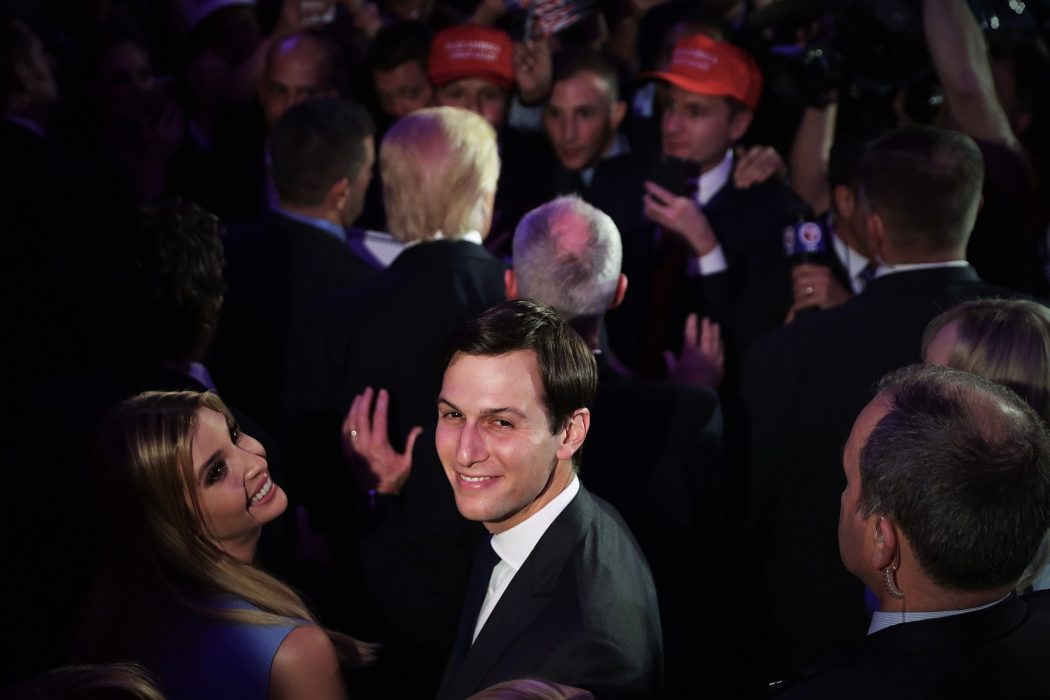From Vanity Fair:
Earlier this year, as his family’s namesake company prepared to partner on a $340 million deal for 733,000 square feet of real estate in downtown Brooklyn, Jared Kushner sounded amazed by the prospect. It wasn’t the dollar figure or the scope of the project. It was the locus. Brooklyn, despite being decades into its evolution from outer borough province to gentrification-on-steroids case study—replete with destination restaurants, gussied-up shuffleboard studios, multiple SoulCycle locations, overpriced condos, Girls, and an obsessively competitive private-school scene—appeared to still be something of a mystery to the 35-year-old real-estate executive and newspaper publisher. “I’ve been checking out my brother’s company and tech companies and people really seem to love Brooklyn,” he told a real-estate acquaintance, in disbelief. “They live there!”
Kushner’s surprise is bewildering. Not only did the young executive live across the river with his wife, Ivanka Trump, and their three children; not only was he in a business aligned entirely with Brooklyn’s growing fortunes; but his own successful company had also invested in a nearby building some three years earlier, to the tune of another $375 million. “My impression wasn’t that he was a moron,” this real-estate acquaintance continued. “But he thought he was so much smarter than he was. That makes for really dangerous and decisive decisions. He is really confident that he’s doing the right thing, but he has no idea what he’s doing.”
Kushner, of course, has not had to endure a long and grinding ascent throughout his career. He matriculated to Harvard shortly after his father, real-estate magnate Charles Kushner, made a $2.5 million gift. Shortly after graduation from a joint law and business degree at N.Y.U., he rose to the the family real-estate throne as a principal at Kushner Companies during his father’s well-documented stint in federal prison. At the same time, he tried to fashion a striving, New York society version of a Cinderella-esque reinvention, purchasing the The New York Observer for $10 million and installing himself as publisher. Not long after the Observer purchase, near the peak of the real-estate bubble, Kushner Companies paid $1.8 billion to acquire 666 Fifth Avenue, a 41-story, embossed aluminum-clad office building across from Rockefeller Center. The deal was staggering, even amid a frothy climate, both for its price and structure. The Kushners paid three times what the building had sold for less than a decade earlier in a debt-filled deal. According to a contemporaneous story in The New York Times, “some real-estate specialists regard the 666 Fifth Avenue transaction as a textbook example of the risky practices that were prevalent before the current credit squeeze.” Years later, the paper would note that the deal was “so highly leveraged that the cash flow from rents amounted to only 65 percent of the debt service.” At the time, Kushner responded to the story by saying, “The good news about our capital structure is that the loan is in place till 2019, and we have over $100 million that we can spend. We’ve put ourselves in a position where we can be competitive to attract tenants.”
Kushner, the scion of a billionaire, has a history of jumping into situations with little experience, making risky calls, and coming out fine on the other end. The Observer, which no longer publishes in print, and hardly wields the influence it used to, is still kicking around. The Fifth Avenue deal, despite costing a fortune, is offset by the portfolio of his mammoth family organization. His foray into politics is yet another example. Indeed, his father-in-law Donald Trump may have run the most chaotic, hate-filled, disorganized campaign in modern American history, but Kushner is likely emboldened by his role in it. Without any previous political experience, he has been credited with masterminding Trump’s digital operation and prompting key hirings and firings, appointments and demotions. His mug appeared on the December cover of Forbes under the bold type face: “This guy got Trump elected.” He is reportedly weighing whether or not he will take on a formal role in the White House. A source told me that the couple is also strongly considering a move to D.C.
Meanwhile, those who knew Kushner during these formative years wonder if he will make the same mistakes of inexperience and hubris on a far more significant scale. According to a number of people who spoke under the condition of anonymity, out of a desire to keep ties with him or professional obligation, Kushner is a kind, charming, mild-mannered guy who has long been overmatched. But he has been buttressed from failure by his rich, well-known family. As he prepares to take on a role with global significance, what happens when the parachute of his family’s wealth can no longer brace the fall?
It is a wonder that Jared Kushner, an observant Jew from a Democratic family from North Jersey, has found a niche for himself in Trump’s merry band of conservative misfits—alt-right news king Stephen Bannon, on-message Republican pollster Kellyanne Conway, and New Hampshire trooper-turned-campaign-manager Corey Lewandowski—considering he has, for much of his life, struggled to find a social place for himself in much friendlier territory. In his Forbes cover story, Kushner said he has dispensed with friends who got upset over his involvement in the Trump campaign. “I call it an exfoliation,” he said in the interview. But a source who has known Kushner since adolescence said that is a generous assessment. “He didn’t have a lot of friends to begin with,” this person said. “So this whole exfoliation thing? Not so much.” A source close to Kushner said that he has always kept his circle small, and that the idea of an exfoliation is overblown.
One Harvard peer who met Kushner in class, and briefly dated him after they graduated, recalled that he was different than most of her other classmates in Cambridge—uninterested in talking about campus gossip or demonstrating any of the typical young adult behavior that was rife on campus. By all measures, Harvard is a place where a person with Kushner’s pedigree should have no problem finding other handsome, polite sons of wealth with whom to consort. And yet, as his classmates enjoyed typical co-ed behavior, Kushner would drive around campus in a Range Rover wearing designer jeans, calling his parents each day and buying up nearby condos and converting them for a healthy $20 million profit, according to a New Yorker profile. His roommate told the magazine of the first time he saw Kushner at a campus dining hall: “Everyone was goofing around. He was reading Crain’s New York Business.”
As the classmate who later dated Kushner told me, Kushner was more of a loner, less comfortable with people his age. “He would walk me back to my dorm from class. He was really interesting and sweet and really listened to me,” she said. “I can’t remember a single person he was friends with while he was there, though. I don’t ever remember seeing him with anyone else.” She said that when they socialized after college, it was mostly with his younger brother, Josh, now an investor and the founder of Oscar, a healthcare start-up. She remembers the brothers Kushner taking her and a friend to dinner in 2007 at a white table-clothed restaurant and watching them squirm in their seats as the two girls talked loudly and drank. “We were typical 20-something girls and got drunk and chatty,” she said. “They looked mortified.”
As Vanity Fair special correspondent Sarah Ellison reported in July, Kushner has a tendency to pal around with moguls twice his age, rather than the 30-something New York scene. A former Observer reporter noted that it was agreed upon in his circle that Kushner bought the publication in order to gain entrée into the world the pink-hued New York paper chronicled. Another former Observer reporter said she was perplexed by his privateness. “He was moving in circles that were not so unlike mine and [I knew] nothing [about his friend group],” she said. “I remember going on a date with someone who went to law school with Jared and he could remember he was rich but nothing else.”
To some extent, it worked. It wasn’t long after he picked up the newspaper that he met his future wife, Ivanka Trump, at a business lunch. Together, the two have assembled a cadre of billionaire-appropriate friends, including Wendi Deng and Rupert Murdoch, on whose yacht he and Ivanka reconnected after the couple briefly broke up in 2008 (Deng and Murdoch have since divorced); David Geffen, on whose yacht the couple vacationed last summer after the Republican National Convention; and, before the election, Chelsea Clinton and her hedge-fund executive husband Marc Mezvinsky. “Those friendships are real, but I don’t know of many non-famous people he is friendly with,” one former associate told me. “When your job is your life and your business is your name, though, I would imagine it’s hard to know when real friendships start and business relationships end.” (It may, perhaps, be easier to figure out post-election. Geffen told The New York Times over the weekend that Kushner is a loyal, smart guy. “Is he a genius? No, but guess what: The geniuses all lost.”)
The most difficult, and important, relationship for Kushner to manage, though, appears to be with his family. He is fiercely loyal to his father, Charles, who pleaded guilty to 18 counts of tax evasion, illegal campaign donations, witness tampering, and setting up his brother-in-law with a prostitute to exact revenge, and was sentenced to two years in an Alabama prison in 2005. Jared, who took the reins of his father’s company at the age of 25 as a result, flew down south to visit Charlie most weekends.
Once he served his time and Charlie came back to the company, Jared remained even more protective. When his famously mercurial father would fly off the handle, screaming in a fit of rage in a meeting, Jared would calmly tap him on the shoulder, repeatedly, muttering “Dad, stop it. Dad, stop it. Dad, stop it,” until he did. Typically measured in the face of bad buzz around town surrounding a deal he was doing or a business decision he made, Kushner could ruffle when his father’s misdeeds were mentioned. That for the Kushners was the nuclear button.
Much has been made of Kushner’s familial loyalty even within the Trump campaign, as reports swirled that he convinced his father-in-law to pass over New Jersey Governor Chris Christie, first as the vice-presidential pick, and again, when he got ousted last month as head of the White House transition team. Christie, as U.S. Attorney, was responsible for putting Charlie Kushner behind bars. A source close to the campaign told me recently that there was a major sticking point in the Christie relationship that Jared could not let go of, and that’s what led him to convince Trump to bypass him.
According to the source, Charlie Kushner was going to be released 28 days early from his sentence. The family was ready, eager, anticipating his arrival home. But he ended up finishing out the time. This source claims that Jared Kushner believes that Christie made sure that Charlie Kushner stayed behind bars for the full sentence, even though the family had already started preparing for his early release. “That really sort of twisted the knife in and he just couldn’t let go of that part of it,” the source said. A source close to Kushner confirmed that this is true.
Charlie Kushner’s humiliation appears to have given Kushner perspective. Oftentimes, in the face of bad news or conflict, he remains supernaturally calm and collected. Part of that is because he was hardened by misfortune, even as every blow was softened by the availability of his massive fortune. “That’s what happens when you grow up with both horrible things, like your dad going to prison, and good things, like being born to a billionaire,” the former associate said. “The horrible stuff teaches you to keep stuff in perspective, and the good reminds you that there’s always a safety net there, even if you mess up.”
Kushner, however, is less circumspect when it comes to deal-making. As Politico reported last month, Kushner was befuddled by the process of working with a local councilman in order to re-zone part of his company’s Brooklyn property. The councilman “had to explain to him, ‘If you’re going for a residential re-zoning, I have to approve it.’ The reaction was, ‘Oh, interesting.’” His flashy bid for the Observer wasn’t much different. Kushner, who had less experience in publishing than he did in real estate, brought in a revolving door of editors and talent to try to inject life back into the paper. What it resulted in, according to former employees, was a complete lack of direction and depressed morale.
“He’s impulsive. He was constantly trying new things and new approaches,” the former reporter who told me about his bid for the paper added. “Every two months there was a new edict—quotas on the number of blog posts we had to write; launching a new vertical on tech; hiring different Web editors. It was like being in a boat that is constantly shifting directions and it’s never really clear where it’s pointing.”
Another former employee said it was very clear he was in over his head to people on staff, and had no real interest in the paper other than what it could do for his status. “There was one meeting he showed up to and one person asked him what was his favorite story that the paper had run recently,” she said. “He had to think about it for a very long time in order to remember anything he’d read. He very obviously didn’t read it.”
That’s not to say he didn’t care about story selection. A number of former employees have noted that Kushner often had a hand in nixing certain stories if they involved his friends or launching investigations that could advance his own interests. Sometimes that meant following up on an issue that Kushner found personally troubling, like the fact that the city decided to make the Park Avenue Tunnel one way. “He became obsessed with it because he thought it was a bad idea, so he had an intern write the story,” the employee who called him “impulsive” told me. When the story wasn’t negative enough, he had another reporter write a follow-up. A source close to Kushner noted that publishers often pass story ideas down to reporters. That is a practice not terribly out of the ordinary.
What irked his reporters as much was the steady stream of cuts and pullbacks they saw under his leadership. The office took out its Keurig machine, they noted, because the pods were too expensive. The beloved Observer-logo T-shirts, for which the paper had used American Apparel cloth, were replaced with cheap, thin substitutions. The office holiday party, which took place at swanky restaurants around Manhattan in the years before Kushner arrived, was ultimately moved to its conference room, where cheese platters and wine were set up. Kushner did show up to toast the staff. (A source close to Kushner denied these cuts, saying that the office still has a fancy coffee machine, that the t-shirts are still American Apparel, and the holiday parties are held at locations all across the city.) “I don’t think he’s a diabolical mastermind,” one of the former reporters told me. “He’s an intellectual lightweight. He ate it on his first real-estate deal and with the paper. He thought it would work out because he thought he had the golden touch.”
Her former colleague was blunter: “It’s dangerous to have someone who thinks he’s so much smarter than he is put in a large position of power,” he said. “It was dangerous to have him in charge of a weekly newspaper.” Last month, the Observer announced it was no longer going to offer print editions at all.
The Jewish community has had a bit more of a nuanced take on Kushner, who grew up going to day school and observing Shabbat (which he still does, with Ivanka, who converted before they got married, and their children). Some have expressed relief that a Jewish adviser to the president, whose campaign was often accused of racist dog whistles and whose whose campaign executive was accused of stoking anti-Semitism, will also have Trump’s ear. (In his Forbes interview, Kushner defended his father-in-law and his campaign. “Trump has disavowed their support 25 times. He’s renounced hatred, he’s renounced bigotry, and he’s renounced racism,” he said. “You can’t not be an anti-Semite for 69 years and all of a sudden become an anti-Semite because you’re running.”) Others have their doubts about whether Kushner will put his faith before his father-in-law. “He would not be the guy where you’d be like, ‘Oh, thank God he’s there,’ the source who has known Kushner since adolescence recently told me, in talking about his faith and the Jewish community’s reaction to his new role. “He wouldn’t be a first- or second- or third-round draft pick.”
Trump has a different idea. When asked about Kushner and his place in his administration in an on-the-record interview with The Times last month, the president-elect responded, “I think he can be very helpful. I would love to be able to be the one that made peace with Israel and the Palestinians. I would love that, that would be such a great achievement. Because nobody’s been able to do it.“ When asked if Kushner would be part of that, he said, “I think he’d be very good at it. I mean he knows it so well. He knows the region, knows the people, knows the players.“
Some of those players have recently agreed. Israel’s foreign minister, Tzipi Hotovely, told This Week in Asia that Kushner gives her hope for a stronger relationship between Israel and the United States. “We would be so happy if someone could bring peace to the Middle East. We welcome him.” Ron Dermer, Israel’s ambassador to the U.S., told The Times, “There’s no question that he feels a strong commitment to Israel’s security and Israel’s future.”
The former Observer reporter who was skeptical of putting Kushner in charge laughed at this idea. “Jared? As an Israel peace maker? He’s not a peace maker. He’s a bomb thrower, if anything.“






